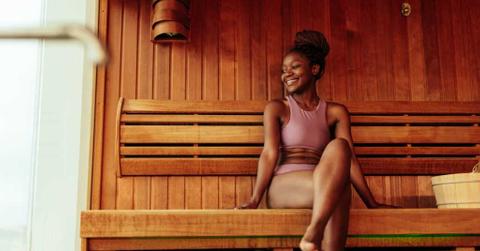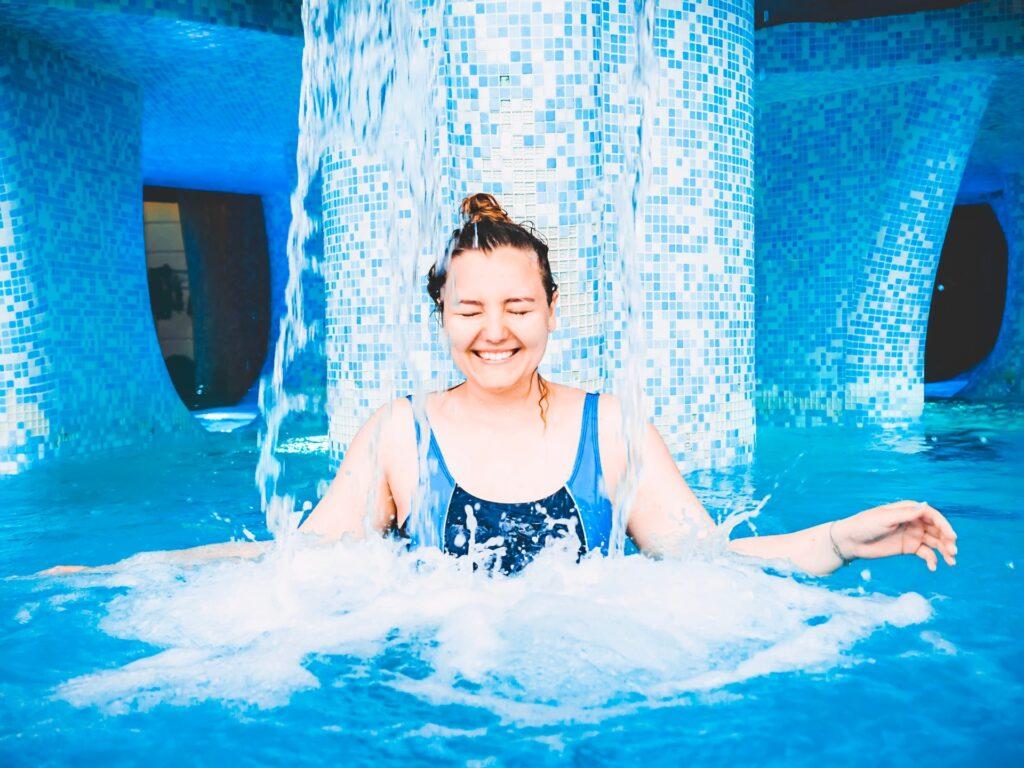Contrast Therapy: Getting To Know The Benefits For Beating Brain Fog And More

If you’re like me and struggle with brain fog, then you’ll understand why I’ll do almost anything if it leads to relief. More than a year ago, when contrast therapy was marketed on social as an exciting and effective way to bolster mental health and clarity, my curiosity got the best of me. I booked my first sauna and cold plunge appointment.
The science of hot and cold exposure is an understudied area, according to experts. Still, preliminary findings suggest how this practice could significantly improve our health and quality of life. So let’s break it down:
What Is Contrast Therapy?

Contrast therapy is when your body is exposed to a contrast of hot and cold temperatures during one wellness experience. “While there’s not enough data to define an optimal protocol, a reasonable approach would be to alternate between a warm plunge (38-40 degrees C) and a cold plunge (8-10 degrees C),” says board-certified dermatologist Dr. Hadley King.
The technique is familiar to athletes who want to recover quickly, however, it’s taken the Web by storm, garnering more than 8 million searches on TikTok alone. It’s been adopted by individuals who want to decrease inflammation, increase longevity, alleviate swelling, and more. Besides these benefits and how it has taught me how to build resilience, it’s helped enhance my cognitive function and promote skin health by fighting inflammation.
Cold Plunges And Health Benefits
Over recent years, wellness trends related to of cold water immersion have been booming— and for good reason. Exposure to the cold has been proven to significantly increase norepinephrine levels, as high as 500%, according to a 2010 study. Norepinephrine is a hormone and neurotransmitter responsible for the increased vigilance, focus, attention, and the high-on-life feeling you get after you plunge into cold water. A rise in its levels can lead to improvements in energy, mood, and cognitive function, reflected by further research findings.
Additionally, research shows that just a single instance of cold water immersion can skyrocket dopamine levels by 250% and noradrenaline levels by 530%. While norepinephrine is more powerful in its effects on the body, especially in concentration, increasing dopamine is equally as important as low levels are associated with brain fog. The production of these well-known brain chemicals can make us feel more energized and like we can conquer anything throughout the day.
“When you take a cold shower or step into a cold plunge, the cold temperature can constrict blood vessels (vasoconstriction), which may make the skin look less red,” shares Dr. Hadley. “Vasoconstriction can also reduce the amount of interstitial fluid that accumulates—so then there is less fluid to be drained by the lymphatic system and less puffiness in your body.”
Saunas And The Contrast Therapy

According to neuroscientist Dr. Andrew Huberman, heat exposure, like that experienced in saunas, can stimulate the production of brain-derived neurotrophic factor, a protein crucial for neuronal growth, synaptic plasticity, and overall cognitive function. While in the sauna, heart rate and blood flow increase, and blood vessels will vasodilate (the opposite of vasoconstriction) as your body cools down. Expanding your blood vessels enhances blood flow to areas of the body lacking oxygen and nutrients, which is crucial for cognitive performance.
In my experience, not only did the dry heat relax my body and clear mind, it can also improve your skin’s complexion through detoxification. Saunas help maintain healthier skin by allowing you to sweat and eliminate toxins. As pores open up in response to heat, impurities are released, cleansing pores, which can contribute to a clearer complexion and improved skin health.
I’ve gotten that post-sauna glow thanks to increased blood flow. “However, if you have rosacea, a sauna could trigger a flare-up and contribute to visible telangiectasias on the face,” warns Dr. Hadley. “Skin conditions like eczema and psoriasis may also be irritated by a sauna.”
A Winning Health Combo
Combining the hot and cold elements provides even more benefits for brain health and your skin barrier than doing just one or the other. The challenging combination of sauna sessions and cold plunges offers a refreshing approach to stress reduction, mood elevation, and resilience building.
The contrasting temperatures stimulate a release of positive hormones such as norepinephrine (which we previously mentioned), prolactin, which helps your brain function faster by enhancing myelination and repair of damaged neurons; and dynorphin, which results in your body becoming more sensitive to the benefits of the release of endorphins, notes the Generator Athlete Lab. Plus, the therapy reduces the stress hormone cortisol, which promotes relaxation, according to a study by Am J Mens Health. This is important because when you’re relaxed, the endocrine and nervous systems will be more balanced, making brain fog symptoms less severe.
The bottom line? Contrast therapy, for me, is medicine for your mind, body, and spirit. Whether its brain fog and poor skin health or not, practicing good habits like contrast therapy for the brain and skin is an investment in a healthier, brighter self later.
Of course, consult your doctor before trying any new activities that impact your health or bodily functions. And if you’re ready to start, grab your towel and immerse yourself in the world of hot and cold.






